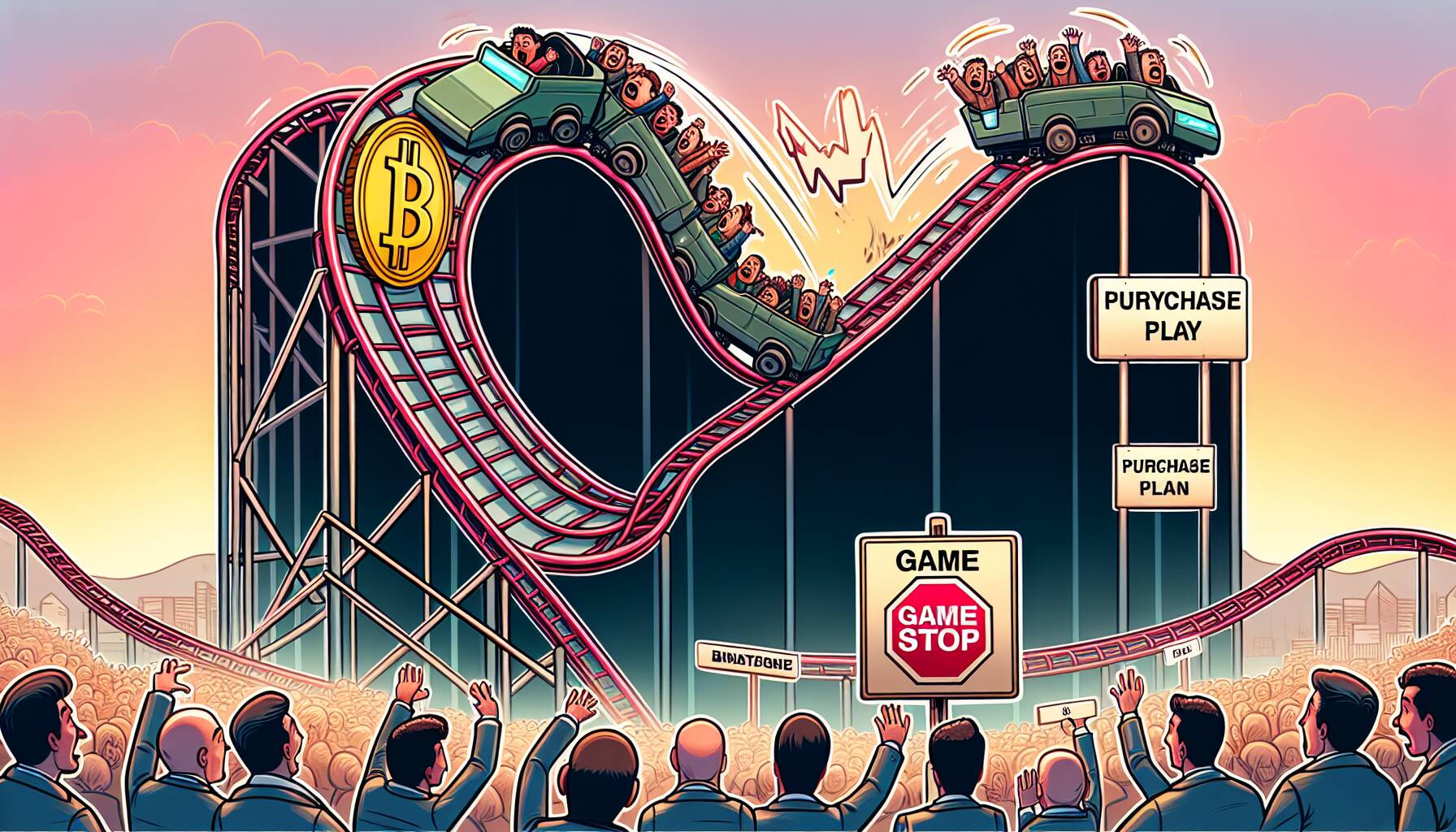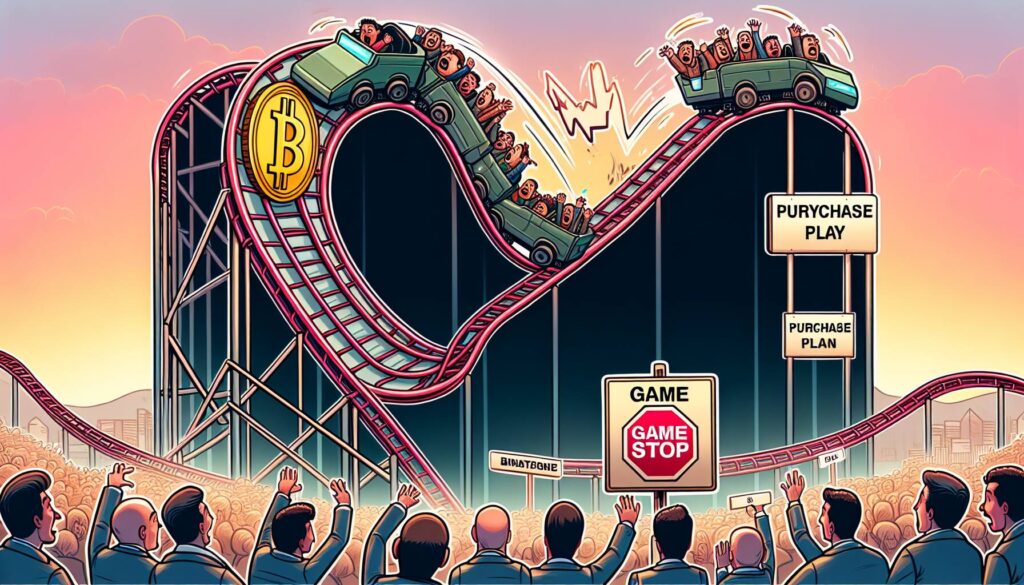In a striking twist for both the gaming and cryptocurrency markets, GameStop’s share prices have experienced a notable decline, erasing some of the gains made just a day earlier. This downturn follows the announcement from the beloved video game retailer, which revealed plans to raise a staggering .3 billion through the sale of notes to fund an acquisition of Bitcoin. The move has left many investors in a state of curiosity and concern, as the once-meme stock pivots towards digital currency investments.
As GameStop aims to solidify its position within the expanding cryptocurrency sector, the decision to close a “significant number” of physical stores further indicates a transformation in its business strategy. This transition underscores the challenges retail businesses face in adapting to changing consumer habits, compounded by the rising popularity of digital currencies. The juxtaposition of this dual strategy also highlights a broader trend, where traditional companies are exploring innovative methods to remain relevant.
“Buckle Up”—Bitcoin price suddenly braced for a ‘Cambrian Explosion’.
As the cryptocurrency wave surges, with headlines about Bitcoin’s potentially explosive growth circulating in financial news, GameStop’s recent actions reflect a significant bet on the future of digital assets. The potential implications for both the company and its shareholders are monumental, marking a calculated risk that could reverberate throughout the market.
With such ambitious plans in motion, the spotlight now shines brightly on GameStop—a company once primarily associated with physical game sales—now navigating the evolving landscape of cryptocurrency. Investors and analysts alike are keen to see how this contentious strategy will unfold in the coming months.

GameStop’s Strategic Shift and Market Reactions
The recent developments surrounding GameStop offer critical insights into the company’s strategic pivot and its implications for investors and the market. Here are the key points from the article:
- Debt Issuance:
- GameStop plans to raise .3 billion through debt issuance.
- The funds will primarily be used to invest in Bitcoin, showcasing a significant shift in the company’s focus.
- Store Closures:
- The company has announced the closure of a ‘significant number’ of its retail stores.
- This move indicates a reevaluation of its traditional business model in favor of digital investments.
- Market Reaction:
- Following the announcement, GameStop shares experienced a drop, reversing previous gains.
- This volatility highlights the uncertain perception of the company’s strategic decisions among investors.
- Bitcoin Investment:
- The shift towards Bitcoin indicates a broader trend of traditional companies entering the cryptocurrency market.
- Investors may need to consider how this trend affects the overall stability and growth potential of both GameStop and the cryptocurrency market.
- Cambrian Explosion in Bitcoin:
- Experts predict a potential ‘Cambrian Explosion’ in Bitcoin prices, indicating significant future volatility.
- This could impact GameStop’s investment and overall market sentiments regarding cryptocurrencies.
These developments are essential for investors to monitor, as they reflect the ongoing adjustments in retail businesses and the emergence of digital currencies.
GameStop’s Bold Move into Bitcoin: A Risky Strategy or a Smart Pivot?
GameStop, long renowned for its status as a meme stock and retail trading phenomenon, is attempting to shift gears by entering the cryptocurrency sphere. This strategic decision, involving a substantial .3 billion debt issuance aimed at acquiring Bitcoin, has sent ripples through the stock market, resulting in a noticeable decline in share value following an earlier uptick. Such a pivot raises important questions about the competitiveness and sustainability of GameStop’s approach compared to its peers in the retail and cryptocurrency market.
On one hand, GameStop’s leap into Bitcoin could position the company as a trailblazer among traditional retailers making headway into the crypto space. This move, if successful, could attract crypto enthusiasts and investors looking for innovative ways to combine gaming culture with the burgeoning digital currency market. Companies like Tesla and Square have already paved the way, demonstrating that tech-savvy investments can garner significant public interest and stock price appreciation. GameStop could leverage this trend, appealing to its core gamer demographic, who are often more open to digital currencies.
However, the strategy also presents significant challenges and risks. The volatility of Bitcoin is notorious; erratic price fluctuations could harm GameStop’s financial stability, especially if the market turns against them shortly after acquiring the cryptocurrency. Additionally, the announcement of store closures serves as a stark reminder that the company is still grappling with its traditional retail challenges. By diverting resources to Bitcoin instead of focusing on its storefronts and customer experience, GameStop could alienate its existing customer base, leaving it vulnerable to competitors who are adapting more cautiously and thoughtfully to market conditions.
The move into cryptocurrency could be advantageous for a diverse set of investors, particularly those bullish on Bitcoin and seeking exposure through a traditional retail platform. Conversely, it may create unease among conservative investors who prefer long-term viability and are wary of the crypto market’s speculative nature. Furthermore, if GameStop’s ventures into Bitcoin fail to create the anticipated value, it could undermine investor confidence, affecting not just stockholders but also the company’s ability to attract future capital and maintain its operational strategy.
In the context of this major strategic shift, it’s essential to monitor if GameStop can effectively manage its dual identity as both a retail and a digital asset holder. Their success or failure may set a precedent for others in the industry trying to navigate the complexities of innovation amidst traditional business challenges.
















